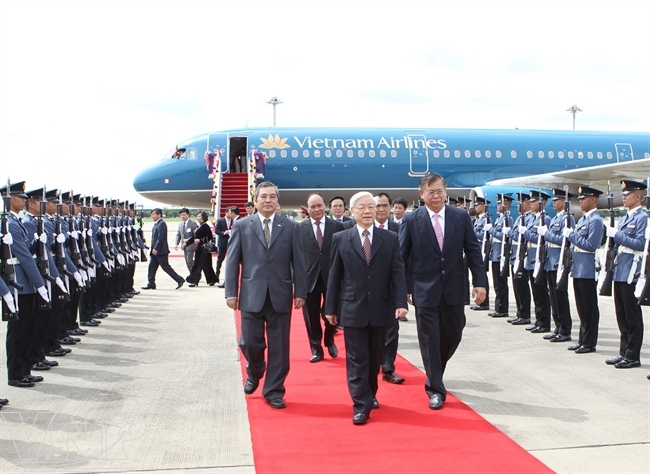Strategic partnership with five main pillars
Since the two countries established diplomatic ties in 1976 and after the visit to Thailand by former Party General Secretary Do Muoi in 1993, the relations on politics, economy-trade, culture and education-training between the two countries have rapidly developed. In 2012, the bilateral trade volume reached over 8.6 billion. Up to February 20, 2013, Thailand has 300 valid direct investment projects in Vietnam with a total registered capital of 6.12 billion USD, ranking tenth among 99 countries and territories having investment in Vietnam. Vietnam has so far had seven projects in Thailand with a total capital of 11.35 million USD. Thailand is the country where there are about 100,000 Vietnamese people who are working and living, creating a firm link for the friendly relationship between the two countries.
With the above advantages, Party General Secretary Nguyen Phu trong and Thailand’s Prime Minister Yingluck Shinawatra reached a consensus on the establishment of a strategic partnership between Vietnam and Thailand with the five main pillars of political relations, defence and security ties, economic cooperation; socio-cultural relations and regional and international cooperation.

In terms of political relations: strengthening mutual trust and understanding through the exchange of high-ranking visits and strategic political dialogues; maintaining the fine political relations to create a firm foundation for the development and cooperation in other fields.
In regard to defence and security ties: fostering, expanding and increasing the effectiveness of defence and security cooperation; strengthening cooperation to solve traditional and non-traditional security challenges; promoting consul cooperation; and reaffirming the pledge not to allow any private organization to use the territory of the other to implement activities against the other country.
"The strategic partnership will contribute to promoting and developing the Vietnam and Thailand relationship more closely and sustainably and further deepening the cooperative relations between the two sides in different fields, including politics, economy, security, culture and tourism. It is a new era of the bilateral relations between Thailand and Vietnam that continually develops and brings happiness to the two countries’ people”.
(Thailand’s Prime Minister Yingluck Shinawatra)
|
In economic cooperation: promoting cooperation on investment and trade energy, telecommunications, information technology and transportation; striving to increase the two-way trade volume to 15 billion USD in 2020; strengthening the transport link between the two countries and with other countries in the region through the current road transport network and economic corridors, particularly the East-West Economic Corridor and Routes 8 and 12.
In terms of socio-cultural relations, people-to-people exchange and other fields of mutual concern: establishing Vietnam-Thailand research centres at some universities in each country; promoting cooperation on labour; enhancing the role of friendship organizations, such as the Thai community in Vietnam and the Vietnamese community in Thailand as well as promoting cooperation at all levels; and promoting the exchange of people through Vietnam-Thailand and Thailand-Vietnam Friendship Organizations.
For regional and international cooperation: promoting joint efforts to build an ASEAN community which is linked in politics and connected in economy and social responsibility, bringing into full play the central role of ASEAN in the regional structure, for peace, cooperation and development in the region; closely coordinating at regional forums, including the Mekong Forum with development partners, narrowing the development gap in Southeast Asia; coordinating and supporting candidates of each other in the United Nations, regional and international organizations.
Striving for peace and development in the region
During this visit, Party General Secretary Nguyen Phu Trong and Thailand’s Prime Minister Yingluck Shinawatra frankly and openly exchanged views on regional and international issues of mutual concern. The two sides agreed that after 45 years since its establishment, ASEAN has grown with an increasing link and connection inside and outside the bloc. However, ASEAN is facing many difficulties and challenges so Vietnam, Thailand and other ASEAN members should continue intensifying solidarity and cooperation to maintain the central role in regional security structure and successfully build an ASEAN Community by 2015, contributing to peace, stability, cooperation and development in the region and the world. They also agreed to promote consultation and cooperation at sub-regional, regional and international forums, such as Phraya-Mekong Economic Cooperation Strategy (ACMECS), the expanded Sub-Mekong region, the East Sea Summit, the United Nations, WTO, APEC and ASEM
.
Related to the East Sea issue, the two leaders expressed concerns over the recent developments in the East Sea and emphasized the importance of maintaining peace and stability in the East Sea, ensuring the long-term prosperity and development in the region. They suggested the concerned parties should solve disputes by peaceful means on the basis of international law, including the 1982 United Nations Convention on the Law of the Sea (UNCLOS 1982) and the Declaration on the Conduct of parties in the East Sea (DOC), and ASEAN’s Six-Point Statement. They agreed to soon build a Code of Conduct in the East Sea (COC), aimed at ensuring peace, security and maritime safety and freedom in the East Sea. The two sides also agreed to strengthen cooperation to use and protect the water resource of the Mekong River for the sustainable development.